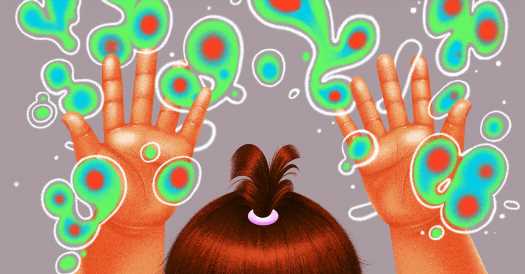A lot of parenting questions boil down to: Is this a thing, or is something wrong? We’re doing an occasional series explaining why certain things seem to happen to your kid (or to your body or to your relationships) as your child grows. This week, we’re talking about how to know when a child’s health anxiety becomes a problem. Read previous “Is this a thing?” newsletters here. If you have a question for a future “Is this a thing?” email us.
Q: My 5-year-old has become a little hypochondriac! She’s convinced she is allergic to many things because she gets “itchy.” She also had a couple of nose bleeds in November, and I now have to do a daily nose check for her. Is this a thing, or an amplified response to pandemic anxiety?
— Heather Thitte, Portland, Maine.
A: I’m glad you asked this question, because so many people, regardless of age, are feeling heightened anxiety about their health during the pandemic. A full three quarters of adults said they were somewhat or extremely anxious about Covid-19, according to a public opinion poll sponsored by the American Psychiatric Association in the fall. Health anxiety in general was up about 9 percentage points from 2019.
I typically don’t worry much about health, but these days whenever anyone in my family experiences an errant symptom I find myself thinking: Is this allergies or Covid? Is this seasonal affective disorder or Covid? Is this just plain exhaustion, or am I going to die? And on and on.
I mention this because I think we need to normalize some level of additional fear, for ourselves and our kids. “We’re in the midst of a pandemic and even if parents are trying to shelter their children from unnecessary news, kids know that people are ill, they know they can’t see family,” said Dunya Poltorak, Ph.D., a pediatric medical psychologist in private practice in Birmingham, Mich. “It’s perfectly reasonable and natural for kids to be concerned about health and well-being, particularly their own.”
So what can you do about a kid who is worried about illness, and how can you tell if it’s tipping from an understandable response to Covid into anxiety that may need medical attention? I asked two child psychologists for their advice.
Get your own fear in check. It’s important to know that our health anxiety can trickle down to our kids. If you’re concerned that your child is overly anxious about their health, “Look at yourself first. Recognize your own concerns and your own big feelings, and then look at your kids and what they’re worrying about,” said Abi Gewirtz, Ph.D., a clinical psychologist, professor at the University of Minnesota and the author of “When the World Feels Like a Scary Place: Essential Conversations for Anxious Parents and Worried Kids.”
Dr. Gewirtz emphasized that being mindful of what you share with your children doesn’t mean pretending nothing is wrong — it means you don’t tell them you’re up three times a night because you’re scared about the new Covid variants. Instead, listen to their fears and acknowledge them, and then reassure your kids that you are looking after them and doing all you can to keep them safe.
Try redirecting instead of reacting. For example, instead of agreeing to check for nose bleeds every day, Dr. Poltorak suggested trying to give your child an activity to focus on. You could say something like: “Nosebleeds are so common in winter, but they’re nothing to worry about. Why don’t we go play with your Legos or get your work space ready for school?”
Make it fun. Or, if you’re going to continue with the daily nose check, try to add some humor into it, Dr. Gewirtz said, without making fun of your child. Pretend to find a colony of bunnies in your kid’s nose, and hop away.
Brainstorm solutions with your child. You can acknowledge their discomfort — in this case, itchiness — and ask them what they think might help them feel better, Dr. Gewirtz said. I have found the promise of “magic lotion” (a.k.a., regular lotion) can fix all manner of problems with my kids, from itchy legs to scrapes to mild sleeplessness.
For older kids, check in daily. Starting in late elementary school, children may be getting their own information, and not always from the best sources. For example, a friend of my daughter’s told her that another child at their school had died from the coronavirus, a garbled story that turned out to be false. So make sure you’re checking in regularly with your kids about what they are hearing about Covid, and where they heard it. “I’m a strong believer in the family meal as a way to check in and provide some emotion coaching about what is happening,” Dr. Gewirtz said.
Find ways to relax together. Whether it means putting on a Cosmic Kids Yoga video, doing a guided meditation or just having a family snuggle and reminiscing about good times, getting calm with your kid can help them worry less, Dr. Poltorak said.
When to worry. Both experts said that if a child’s anxiety over their health is so intense that it is interrupting their daily life — their sleeping or eating is affected, or it’s keeping them from going to day care or school — it’s time to talk to your pediatrician about additional help.
Source: Read Full Article
